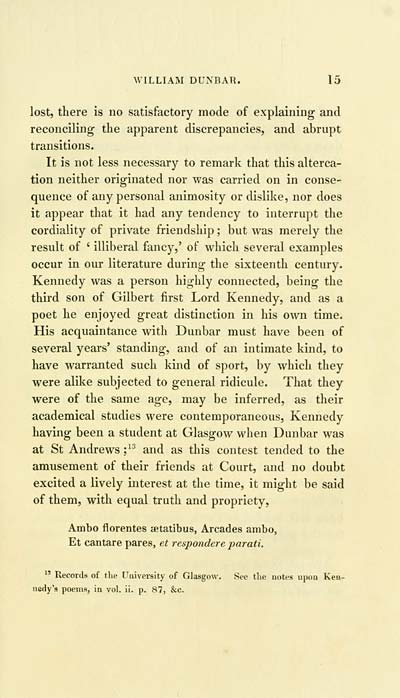Download files
Complete book:
Individual page:
Thumbnail gallery: Grid view | List view

WILLIAM DUNBAR. 15
lost, there is no satisfactory mode of explaining and
reconciling the apparent discrepancies, and abrupt
transitions.
It is not less necessary to remark that this alterca-
tion neither originated nor was carried on in conse-
quence of any personal animosity or dislike, nor does
it appear that it had any tendency to interrupt the
cordiality of private friendship ; but was merely the
result of ' illiberal fancy,' of which several examples
occur in our literature during the sixteenth century.
Kennedy was a person highly connected, being the
third son of Gilbert first Lord Kennedy, and as a
poet he enjoyed great distinction in his own time.
His acquaintance with Dunbar must have been of
several years' standing, and of an intimate kind, to
have warranted such kind of sport, by which they
were alike subjected to general ridicule. That they
were of the same age, may be inferred, as their
academical studies were contemporaneous, Kennedy
having been a student at Glasgow when Dunbar was
at St Andrews;'^ and as this contest tended to the
amusement of their friends at Court, and no doubt
excited a lively interest at the time, it might be said
of them, with equal truth and propriety,
Ambo florentes setatibus, Arcades anibo,
Et cantare pares, et respondere parati.
" Records of the Iluivevsity of Glasgow. See the notes upon Ken-
nedy's poems, in vol. ii. p. 87, &c.
lost, there is no satisfactory mode of explaining and
reconciling the apparent discrepancies, and abrupt
transitions.
It is not less necessary to remark that this alterca-
tion neither originated nor was carried on in conse-
quence of any personal animosity or dislike, nor does
it appear that it had any tendency to interrupt the
cordiality of private friendship ; but was merely the
result of ' illiberal fancy,' of which several examples
occur in our literature during the sixteenth century.
Kennedy was a person highly connected, being the
third son of Gilbert first Lord Kennedy, and as a
poet he enjoyed great distinction in his own time.
His acquaintance with Dunbar must have been of
several years' standing, and of an intimate kind, to
have warranted such kind of sport, by which they
were alike subjected to general ridicule. That they
were of the same age, may be inferred, as their
academical studies were contemporaneous, Kennedy
having been a student at Glasgow when Dunbar was
at St Andrews;'^ and as this contest tended to the
amusement of their friends at Court, and no doubt
excited a lively interest at the time, it might be said
of them, with equal truth and propriety,
Ambo florentes setatibus, Arcades anibo,
Et cantare pares, et respondere parati.
" Records of the Iluivevsity of Glasgow. See the notes upon Ken-
nedy's poems, in vol. ii. p. 87, &c.
Set display mode to: Large image | Transcription
Images and transcriptions on this page, including medium image downloads, may be used under the Creative Commons Attribution 4.0 International Licence unless otherwise stated. ![]()
| Early Gaelic Book Collections > J. F. Campbell Collection > Poems of William Dunbar > Volume 1 > (35) |
|---|
| Permanent URL | https://digital.nls.uk/81328835 |
|---|
| Description | Volume first. |
|---|---|
| Shelfmark | Cam.2.e.18 |
| Additional NLS resources: | |
| Attribution and copyright: |
|
| Description | Now first collected with notes, and a memoir of his life by David Laing. |
|---|---|
| Shelfmark | Cam.2.e.18-19 |
| Additional NLS resources: | |
| Description | Volumes from a collection of 610 books rich in Highland folklore, Ossianic literature and other Celtic subjects. Many of the books annotated by John Francis Campbell of Islay, who assembled the collection. |
|---|
| Description | Selected items from five 'Special and Named Printed Collections'. Includes books in Gaelic and other Celtic languages, works about the Gaels, their languages, literature, culture and history. |
|---|

